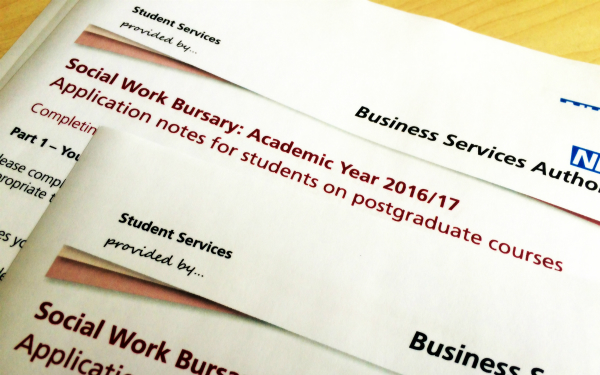
By Helen Gormley
After a succession of delays, this month social work students finally received confirmation of the government’s social work bursary allocations for this year.
The longer term future of the bursary, however, remains uncertain with reports suggesting ministers are considering scrapping the funding entirely. As chair of BASW’s reference group for students and newly qualified social workers I believe this is an important issue. It is also one our group has attempted to engage both the education and health ministers on.
Sadly our efforts have so far fallen on deaf ears. All we received was a response from a senior civil servant, who reiterated the government’s plan to consult on the future funding of social work education alongside a commitment to honour bursaries already awarded to students.
While it is good for those of us already in the throes of a social work degree to at least know that our expectations will be met, future social work students need clarity on the government’s plans to allow them to form their own opinions and make financially sound decisions about their studies.
The silence from ministers leaves us with many questions. With the announcement of £100m in new funding for ‘fast track’ schemes aimed at attracting high academic achievers into social work, will there be any money left in the pot to support students on other pathways? The government talks about the future for social work, but how inclusive or exclusive will this future be?
Ours is a profession underpinned by acceptance of diversity and equality. The opportunities the bursary opens up to people who may not otherwise be able to study social work is vital in promoting that equality and diversity.
Yet ministers seem to be ignoring the potential consequences of their education reforms. By funding routes that are only open to high achieving graduates (fast-track schemes have a minimum entry requirement of a 2:1 degree), and reducing the support on offer through bursaries, will people with lived experience who didn’t get the opportunity to study an undergraduate degree be frozen out?
This would be a great loss and could deny those with lived experience and genuine empathy the chance to share their knowledge with colleagues for the benefit of those we support.
There are concerns over racial diversity too. The evaluation reports on Step up to Social Work and Frontline both found both fast-track schemes had fewer participants from black and minority ethnic backgrounds compared to social work degree courses.
Let’s hope that the impending consultation is not a forgone conclusion of scrapping a much-needed bursary. Let’s hope also that social work students, practitioners and professional bodies will have a genuine chance to contribute to the debate.
While we wait for the consultation, our group will continue to seek answers from government. We aim to be fully representative of the national voice of students and future students who may be affected by the consultation outcome. Do contact us to add your voice.
Helen Gormley is Chair of the BASW England Student and Newly Qualified Social Workers Reference Group


 Bournemouth, Christchurch and Poole
Bournemouth, Christchurch and Poole  Hampshire County Council
Hampshire County Council  Lincolnshire County Council
Lincolnshire County Council  Norfolk County Council
Norfolk County Council  Northamptonshire Children’s Trust
Northamptonshire Children’s Trust  South Gloucestershire Council
South Gloucestershire Council  Wiltshire Council
Wiltshire Council  Wokingham Borough Council
Wokingham Borough Council  Children and young people with SEND are ‘valued and prioritised’ in Wiltshire, find inspectors
Children and young people with SEND are ‘valued and prioritised’ in Wiltshire, find inspectors  How specialist refugee teams benefit young people and social workers
How specialist refugee teams benefit young people and social workers  Podcast: returning to social work after becoming a first-time parent
Podcast: returning to social work after becoming a first-time parent  Podcast: would you work for an inadequate-rated service?
Podcast: would you work for an inadequate-rated service?  Family help: one local authority’s experience of the model
Family help: one local authority’s experience of the model  Workforce Insights – showcasing a selection of the sector’s top recruiters
Workforce Insights – showcasing a selection of the sector’s top recruiters 

 Facebook
Facebook X
X LinkedIn
LinkedIn Instagram
Instagram
The bursary was essential for me as a mature student with a young family. To lose the bursary will price more mature students, who are likey loosing a full time wage to commit to training for the profession, out of the opportunity to make a difference.
For me the bursary was essential. As a mature student, I used the bursary to contribute towards my rent. In addition, I had to work part time to make ends meet. Whilst on placements, I also had to work weekends. This left me with very little time especially when I had assignments to also do. Therefore, without the bursary, It would have been virtually impossible for me to had done the course.
The bursary for me was a deciding factor to leave my job and dedicate my time to the course. As a single mum of two it also has allowed me precious time for the children also without the pressure of juggling a job as well. Social work needs the best students who work so hard and are given the time and opportunity to do so, the bursary contributes to establishing this. If our government want the elite then they need to nuture and support the best.